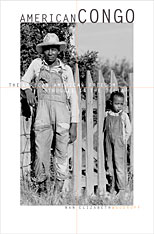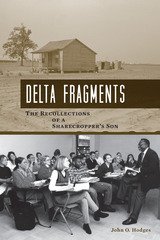
This is the story of how rural Black people struggled against the oppressive sharecropping system of the Arkansas and Mississippi Delta during the first half of the twentieth century. Here, white planters forged a world of terror and poverty for Black workers, one that resembled the horrific deprivations of the African Congo under Belgium’s King Leopold II.
Delta planters did not cut off the heads and hands of their African American workers but, aided by local law enforcement, they engaged in peonage, murder, theft, and disfranchisement. As individuals and through collective struggle, in conjunction with national organizations like the NAACP and local groups like the Southern Tenant Farmers’ Union, Black men and women fought back, demanding a just return for their crops and laying claim to a democratic vision of citizenship. Their efforts were amplified by the two world wars and the depression, which expanded the mobility and economic opportunities of Black people and provoked federal involvement in the region.
Nan Woodruff shows how the freedom fighters of the 1960s would draw on this half-century tradition of protest, thus expanding our standard notions of the civil rights movement and illuminating a neglected but significant slice of the American Black experience.

Come in at the Door is the first in March’s “Pearl County” collection, and it tells the story of Chester, a boy who lives with his withholding, widowed father, and Mitty, who keeps house and serves as a surrogate wife to Chester’s father and a mother to Chester. One morning before dawn, Mitty takes Chester to the Athlestan courthouse to watch the hanging of a man who’d killed “a grotesque, dwarflike creature” he thought had “laid a conjure” on him.
Throughout Chester’s rambunctious young manhood, the gruesome memory hovers just below the surface of his mind, recalled in detail only at his father’s death, when the book sweeps forward to its shattering denouement. A classic of Southern Gothic that illuminates family, class, race, and gender, Come in at the Door marks the homecoming of a Southern storyteller at the peak of his craft.

Hodges has structured the book as a series of brief but revealing vignettes grouped into two main sections. In part 1, “Learning,” he introduces us to the town of Greenwood and to his parents, sister, and myriad aunts, uncles, cousins, teachers, and schoolmates. He tells stories of growing up on a plantation, dancing in smoky juke joints, playing sandlot football and baseball, journeying to the West Coast as a nineteen-year-old to meet the biological father he never knew while growing up, and leaving family and friends to attend Morehouse College in Atlanta. In part 2, “Reflecting,” he connects his firsthand experience with broader themes: the civil rights movement, Delta blues, black folkways, gambling in Mississippi, the vital role of religion in the African American community, and the perplexing problems of poverty, crime, and an underfunded educational system that still challenge black and white citizens of the Delta.
Whether recalling the assassination of Medgar Evers (whom he knew personally), the dynamism of an African American church service, or the joys of reconnecting with old friends at a biennial class reunion, Hodges writes with a rare combination of humor, compassion, and—when describing the injustices that were all too frequently inflicted on him and his contemporaries—righteous anger. But his ultimate goal, he contends, is not to close doors but to open them: to inspire dialogue, to start a conversation, “to be provocative without being insistent or definitive.”

In Remembering Emmett Till, Dave Tell gives us five accounts of the commemoration of this infamous crime. In a development no one could have foreseen, Till’s murder—one of the darkest moments in the region’s history—has become an economic driver for the Delta. Historical tourism has transformed seemingly innocuous places like bridges, boat landings, gas stations, and riverbeds into sites of racial politics, reminders of the still-unsettled question of how best to remember the victim of this heinous crime. Tell builds an insightful and persuasive case for how these memorials have altered the Delta’s physical and cultural landscape, drawing potent connections between the dawn of the civil rights era and our own moment of renewed fire for racial justice.
READERS
Browse our collection.
PUBLISHERS
See BiblioVault's publisher services.
STUDENT SERVICES
Files for college accessibility offices.
UChicago Accessibility Resources
home | accessibility | search | about | contact us
BiblioVault ® 2001 - 2024
The University of Chicago Press









